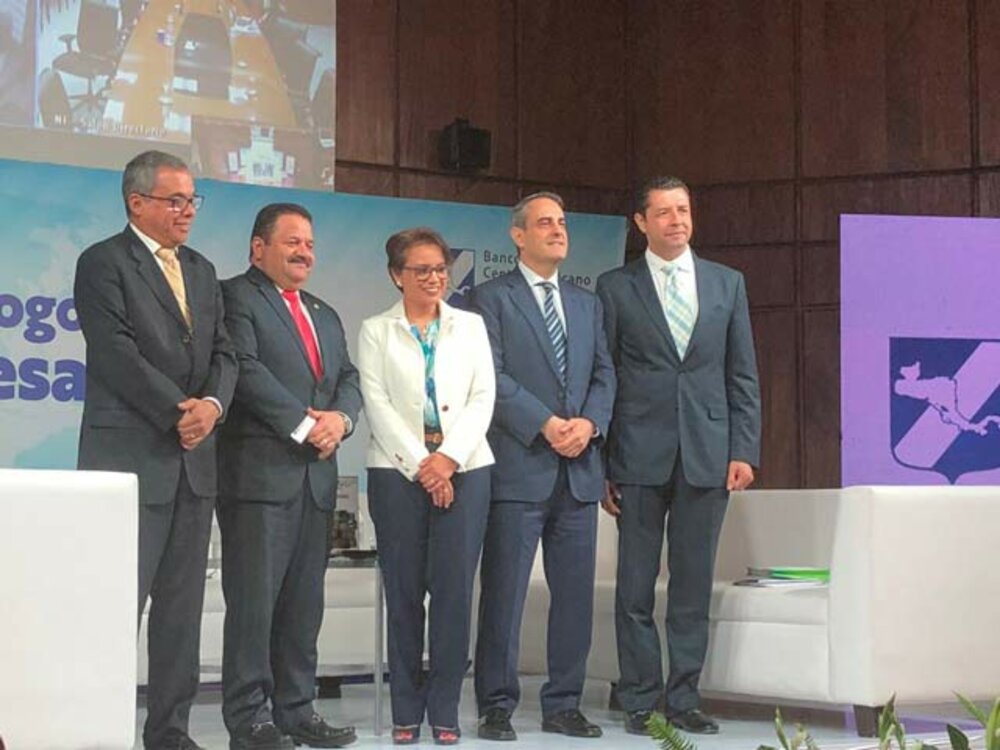CABEI highlights the role of multilateral development organizations in matters of integration and sustainable development

The advisor of the Department of Economic Research and Regional Cooperation of the Asian Development Bank, Dr. Jesus Felipe Tablado, shared experiences.
CABEI Executive Vice President Attorney Alejandro Rodríguez Zamora, highlighted the role of development banks in the progress of the countries of the region.
Tegucigalpa, May 29, 2019.- Today, the Central American Bank for Economic Integration (CABEI), which is the strategic ally of the region, organized the conference denominated, "Experiences of development in Asia and lessons for Central America." The conference was presided over by Dr. Jesús Felipe Tablado, who is an advisor of the Department of Economic Research and Regional Cooperation of the Asian Development Bank and held at the CABEI headquarters.
In his opening speech, CABEI Executive Vice President, Attorney Alejandro Rodríguez Zamora indicated that it was a privilege to have the presence of Dr. Jesus Tablado to provide a space for analysis on the progress made in Asia and the challenges regarding the implementation of the lessons learned for Central America.
He added that it is essential for CABEI to facilitate cooperation and the exchange of experiences, as well as to provide inputs in regional forums that promote dialogue and communication between national actors and multilateral entities that promote economic growth.
For his part, the speaker Dr. Jesus Felipe Tablado, shared his thoughts on the economic progress of Asian countries based on processes of transformation in productive structures, which involve the movement of resources, capital and labor into the manufacturing sector and subsequently services.
The expert pointed out that the transformation process involves a series of related factors. One of the main lessons of the Asian experience is to recognize the manufacturing sector as the main engine of economic growth and employment generation. The development of the manufacturing industry promotes productivity gains that transcend to other productive sectors, in addition to fostering investment, capital accumulation and producing cutting edge technology with higher added value, which is the main difference when compared to traditional sectors.
Finally, the expert called on the international community of cooperators and multilateral banks to play a catalytic role in the process set forth by the agenda of structural change and the need to achieve higher levels of development that guarantee the wellbeing of people and respect for the environment.
The second part of the conference was attended by Honduran Minister of Social Development, Mr. Arnaldo Castillo; analyst, Dr. Julio Raudales; and representative of the Chamber of Commerce and Industry of Tegucigalpa, Mr. Rafael Medina; they made an analysis of the country's challenges regarding the sustainable development agenda.
About the expert
Dr. Jesus Felipe Tablado is from Spain and has been an advisor of the Department of Economic Research and Regional Cooperation of the Asian Development Bank since 2012. He has worked at the Asian Development Bank since 1996.
He has also held academic positions at the Georgia Institute of Technology and the Hong Kong University of Science and Technology. Likewise, he obtained PhD from the University of Pennsylvania.
His research interests extend into areas such as long-term growth in Asia, the dynamics of structural transformation, industrial policy, inclusive growth and full employment, as well as impact of technology on employment, productivity, technological progress, functional distribution of income, economic cycles and trajectory of benefit rates.
He has published in academic journals on different aspects of development, productivity and structural transformation in Asia, as well as books on labor markets, structural transformation, industrial policy and the fundamentals of the aggregate production function.






